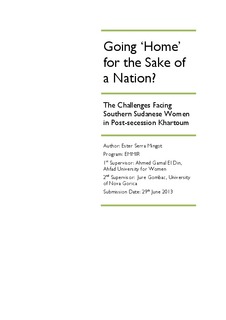| dc.description.abstract | After two civil wars and almost 50 years of struggle that led to the largest amount of internally displaced persons in the world, in January 9, 2005, Sudan reached a Comprehensive Peace Agreement, which ostensibly ended the North-South conflict and asserted the principle of self-determination for South Sudan after a 6-year transitional period. Nevertheless, in its practical implementation a series of important issues remained unattended, such as the future arrangements on citizenship and nationality in case of secession. Thus, after the Referendum for self-determination in January 9, 2011 (where almost 99% of southern Sudanese voted for separation), and the formal secession of the South in July 9, 2011, a 9-month transitional period was established, during which southern Sudanese should either return to South Sudan or stay in the Republic of Sudan as foreigners.
It is in this context that this research shall address the issue of how new borders have shaped southern Sudanese’s statuses, elaborating on the challenges related to the decision to leave or remain in the Republic of Sudan after the separation, and the main factors shaping such decision, namely: socioeconomic, gender, and identity issues. Aware of the heterogeneity of such group of people, this dissertation focuses specifically on a young generation of women, most of whom were born in Khartoum or moved to the city at an early age, accompanying their families, who moved there for different reasons. Considering the characteristics of the research, whereby socio-cultural and behavioural topics are to be analysed, a qualitative approach shall serve better the purposes of the research, in that it provides the opportunity to stay open for research subjects and methods, so that unexpected information can take part in the emerging theory. Additionally, given the selected study group and the current changing political and socioeconomic context in Sudan, this research shall be developed by using grounded theory methods, in order to grasp not only such changing context but how it shapes people’s decisions. | no_NO |
